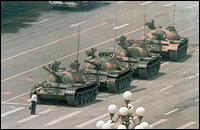Student Demonstrations in Tiananmen Square

June 3-4, 1989
 |
A massive demonstration for democratic reform, begun on Tiananmen Square by Chinese students in April, 1989, was brutally repressed on June 3 and 4, 1989. It was initiated to demand the posthumous rehabilitation of former Communist Party Chairman Hu Yaobang.
The government was tolerant until after his funeral; then Deng Xiaoping denounced the protests. The demonstrators were joined by workers, intellectuals, and civil servants, until over a million people filled the square. General Secretary Zhao Ziyang expressed sympathy, but lost out to Deng, who supported the use of military suppression.
Martial law was declared on May 20. The protesters demanded that the leadership resign, but the government answered on the nights of June 3 and 4 with troops and tanks, killing thousands to quell a "counter-revolutionary rebellion." Zhao was dismissed and a number of the student leaders were arrested.
Tiananmen Square is a large public square in Beijing, China, on the southern edge of the Inner or Tatar City. The square, named for its Gate of Heavenly Peace (Tiananmen), contains the monument of the heroes of the revolution, the Great Hall of the People, the museum of history and revolution, and the Mao Zedong Memorial Hall. Mao Zedong proclaimed the founding of the People's Republic in the square on October 1, 1949, an anniversary still observed there.
The Columbia Encyclopedia, Fifth Edition Copyright © 1993, Columbia University Press. Licensed from Inso Corporation. All rights reserved.







